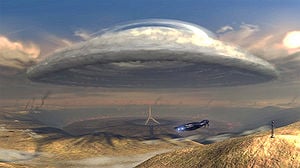Portal at Voi: Difference between revisions
From Halopedia, the Halo wiki
(us spelling only) |
No edit summary |
||
| Line 43: | Line 43: | ||
Interpretations of the size of the Artifact vary. In-game, the diameter of the structure is estimated to be 25.515 kilometers using the size of a Covenant [[CCS-class Battlecruiser|Battlecruiser]] above the portal and an overhead image or [[Pan Cam]] coordinates.<ref> http://carnage.bungie.org/haloforum/halo.forum.pl?read=845588 </ref> | Interpretations of the size of the Artifact vary. In-game, the diameter of the structure is estimated to be 25.515 kilometers using the size of a Covenant [[CCS-class Battlecruiser|Battlecruiser]] above the portal and an overhead image or [[Pan Cam]] coordinates.<ref> http://carnage.bungie.org/haloforum/halo.forum.pl?read=845588 </ref> | ||
However, several geographical facts seem to imply otherwise. As evidenced by ''[[Halo 3]]'' and ''[[Halo 3: ODST]]'', the Portal stretches from the edge of the metropolis of [[New Mombasa]] all the way to the edge of [[Voi]]. The distance between these cities is well over 100 | However, several geographical facts seem to imply otherwise. As evidenced by ''[[Halo 3]]'' and ''[[Halo 3: ODST]]'', the Portal stretches from the edge of the metropolis of [[New Mombasa]] all the way to the edge of [[Voi]]. The distance between these cities is well over 100 kilometres. In this light, a diameter of mere 25.5 kilometers is an impossibility. This is further evidenced by the ending cutscene of ''Halo 3'', where the Portal is seen from low orbit. It is clearly close to the African coastline instead of being deep into the mainland, which would inevitably be the case if the portal was only 25 kilometers in diameter. | ||
If the intended diameter of the structure was a mere 25 kilometers, it would also mean that the Forerunner Dreadnought would be radically smaller than it appears to be in ''[[Halo 2]]'' and ''[[Halo: Uprising]]''.<ref>''[[Halo 2]]''</ref><ref>''[[Halo 3]]''</ref><ref>''[[Halo 3: ODST]]''</ref><ref>http://nikon.bungie.org/misc/sloftus_scalecomparison/?display=HighCharity</ref> From this it can be assumed that the portal is likely smaller in-game than its actual intended size, due to engine limitations; generating map geometry for over a 10700 km<sup>2</sup> area would be an impossibility on the ''Halo 3'' engine. | If the intended diameter of the structure was a mere 25 kilometers, it would also mean that the Forerunner Dreadnought would be radically smaller than it appears to be in ''[[Halo 2]]'' and ''[[Halo: Uprising]]''.<ref>''[[Halo 2]]''</ref><ref>''[[Halo 3]]''</ref><ref>''[[Halo 3: ODST]]''</ref><ref>http://nikon.bungie.org/misc/sloftus_scalecomparison/?display=HighCharity</ref> From this it can be assumed that the portal is likely smaller in-game than its actual intended size, due to engine limitations; generating map geometry for over a 10700 km<sup>2</sup> area would be an impossibility on the ''Halo 3'' engine. | ||
Revision as of 22:55, February 18, 2010
Template:Ratings Template:Haloring The Artifact,[1] known to the scientific community as the Excession at Voi,[2] a Forerunner artifact in Kenya, Africa on planet Earth, designed to generate a slipspace portal to Installation 00. It was buried between the town of Voi and the city of Mombasa, and uncovered by the Covenant during the Battle of Earth in late 2552.
History
Ancient History
According to the messages from a Forerunner known as the Librarian contained throughout the Terminals on the Ark, the artifact on Earth was the last of numerous gateways constructed throughout the galaxy, and was buried shortly before the activation of the Halo rings. An ancient African elder named N'chala witnessed its construction by Strato-Sentinels.
Battle of Earth

Following the Prophet of Regret's retreat from Earth during the Battle of Earth, a massive Covenant fleet led by Jiralhanae arrived to swiftly take control of the battle from the Sangheili. On the same day, they started the uncovering of the artifact by glassing. It is unknown when the process would be completed, but it was ready for The Prophet of Truth's arrival on the 17th of November.
The Prophet of Truth landed the Forerunner Dreadnought on the Forerunner structure, and an unusual electric storm started up above it. Before its activation, he traveled to the Superintendent's data center deep under New Mombasa, where Covenant forces had excavated a tunnel leading into the Artifacts's underground sections.[3]
The UNSC military unit ONI Recon 111 reported to Commander Miranda Keyes that the "cruisers above the crater have stopped...they've found something"[4]. The UNSC attempted to attack the structure, falsely presumed to be the Ark by UNSC intelligence; but was unsuccessful due to heavy Covenant Loyalist anti-aircraft batteries. A small strike force in the city of Voi, consisting of John-117 and some Marines and factory workers neutralized an AA battery to clear a path for three Frigates and numerous Longswords. These then made several attacks on the Dreadnought with MAC Cannons and Air to Air Missiles, but with no effect. Truth then activated the Gateway, opening a large Slipspace rift above the Artifact which led to the real Ark, which is revealed to be outside the Milky Way galaxy. Truth and the rest of the Loyalist fleet advance through the rift as the Separatist fleet, along with Thel 'Vadam, Miranda Keyes, and SPARTAN-117 pursue them to the Ark.
In 2553, after the battle, civilian xenoarchaeologists were hired by the Office of Naval Intelligence to study the artifact. While closed, it was still drawing power from an unknown source and the majority of the passageways below it were still unexplored.[2]
Appearances
The storm was first seen in the Halo 3 Announcement Trailer, when the camera shows the artifact being uncovered & activated. The storm lies directly over it, lightning bolts are seen flashing out of the clouds and the formation seems to have an eye, like a hurricane would. When the portal is activated, the beam travels up through this eye and disappears.
In the level Crow's Nest, when a player looks up at some of the computer monitors, you will see a map of the local area. The map will have a mass of clouds beginning to show a swirling motion around the area. When you enter the level Tsavo Highway, you can see a doughnut-shaped mass of clouds above the artifact that the Covenant are excavating. When you proceed to the level The Storm, the storm has intensified and grown. The clouds now bring rain to the area, and certain parts of the cloud glow as if cloud-to-cloud lightning is occurring. When Truth activates the Artifact, the solid blue beam shoots up into the cloud formation's eye and opens the portal to the Ark.
After the portal is opened, and the level Floodgate begins, the remains of the clouds are seen broken up and swirling around the portal in the sky, having been disrupted by the opening of the portal itself.
The artifact is also seen in the ending cinematic of Halo 3: ODST, where a fleet of Covenant ships are excavating the object.
Size
Interpretations of the size of the Artifact vary. In-game, the diameter of the structure is estimated to be 25.515 kilometers using the size of a Covenant Battlecruiser above the portal and an overhead image or Pan Cam coordinates.[5]
However, several geographical facts seem to imply otherwise. As evidenced by Halo 3 and Halo 3: ODST, the Portal stretches from the edge of the metropolis of New Mombasa all the way to the edge of Voi. The distance between these cities is well over 100 kilometres. In this light, a diameter of mere 25.5 kilometers is an impossibility. This is further evidenced by the ending cutscene of Halo 3, where the Portal is seen from low orbit. It is clearly close to the African coastline instead of being deep into the mainland, which would inevitably be the case if the portal was only 25 kilometers in diameter.
If the intended diameter of the structure was a mere 25 kilometers, it would also mean that the Forerunner Dreadnought would be radically smaller than it appears to be in Halo 2 and Halo: Uprising.[6][7][8][9] From this it can be assumed that the portal is likely smaller in-game than its actual intended size, due to engine limitations; generating map geometry for over a 10700 km2 area would be an impossibility on the Halo 3 engine.
It should be noted that these estimations are centered around the the size of the excavated portion of the Portal. The extent of the underground installations surrounding it is still unknown.
Trivia
- On Behind the Scenes on the Halo 2 Collectors Edition, there is actually a sketch of the Artifact upon activation.
- At a point in the level The Storm, a group of UNSC Marines are present around a radio. Intel comes over the communications channel and says,"...winds inside the storm have been clocked at over 200 kilometers per hour."
- The Artifact was originally both underground and submerged, lying under a massive ocean inlet. By the events of Halo 3, the entire lake and the earth below had been vaporized by Covenant cruisers to unveil the Artifact.
- At the end of Halo 3 where Lord Hood is making his concluding Tribute speech about the Human-Covenant War and the Marines who died in the strife and war, you can see that the Artifact is inactive when the Phantom comes to transfer the Arbiter to the Shadow of Intent.
- When the frontal half of the Forward Unto Dawn came back to Earth through the portal, instead of exiting it above the structure where the Slipspace rift would be, it ended up exiting in Earth's orbit, due to the portal being closed. This indicates that from the Ark, one-way access through the portal was possible, even if the portal on Earth was closed.
- The 14 monoliths that lift up after activation of the portal is another reference to the number 7 (7+7=14). The entire structure seems to be constructed of 7 identical parts, with seven pairs of monoliths.
- It has been further stated by Bungie that at one point, during story conception, the area that ended up being the Portal had originally been intended to be The Ark itself.
- The monoliths bear a striking resemblance to the monoliths around the Atmosphere Processor from the film Aliens.
Gallery
- The Kenyan Savannah overrun by Loyalists.jpg
Covenant forces above the Artifact.
- Ark sTITCH.jpg
Earth_Ark seen in the Halo 2 Collectors edition DVD.
- DJC-Portal.jpg
The Artifact, viewed from directly above its center.
- 83198187-Full.jpg
A high-altitude view of the Artifact, used to measure its size.
Sources
- ^ G4TV Bungie Interview, December 8, 2009
- ^ a b Halo: Evolutions - Essential Tales of the Halo Universe, From the Office of Dr. William Arthur Iqbal
- ^ Halo 3: ODST, legendary ending cutscene
- ^ Tsavo Highway (Level), Halo 3
- ^ http://carnage.bungie.org/haloforum/halo.forum.pl?read=845588
- ^ Halo 2
- ^ Halo 3
- ^ Halo 3: ODST
- ^ http://nikon.bungie.org/misc/sloftus_scalecomparison/?display=HighCharity



